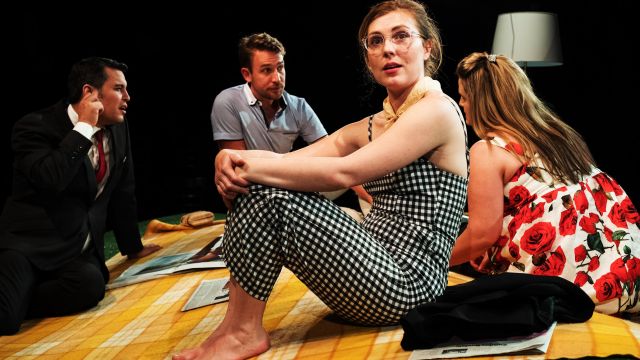She Rode Horses Like the Stock Exchange
Amelia Roper’s play is aptly set on the intimate KXT stage. Here the audience can watch the characters closely, read their facial expressions, feel the tension of silent insinuations and react to them … more often than not in wry smiles and embarrassed laughter. Yet this is not just a funny play. I wish I had been able to see it earlier in the run to let people know how well it has been written, directed and performed. =
Set in Connecticut in the lead-up to the Global Financial Crisis, social and political implications hover, like predatory ghouls, above the action, never actually voiced but skilfully inferred by the four millennials who, in the words of director Nell Ranney, are “the next generation navigating a brave new frontier of gender roles and expectations”. Fueled by the ambition and affluence of the first few years of the new century, they have achieved ‘big things’ but are now beginning to face the crumbling values that the ‘American Dream’ once offered. That Roper can make it funny is a tribute to her natural, economic dialogue and her insights into how couples really relate.

She writes of theatre: “I like plays because two characters can say entirely contradictory things and both be right … and sometimes no one knows what the hell is going on and the play becomes about the struggle to articulate.”
And that is just what happens in this play.
Two couples meet on a blanket in a park. For Sara (Nikki Britton) and Henry (Tom Anson Mesker) this is “Sunday, fun day”, their time together away from Sara’s bank and Henry’s more humanitarian work as a nurse. Sara is bright, ambitious, hitting hard against the financial glass ceiling. Henry is more gentle and sensitive to the world around them. Sara has just bought a ‘very big house’ … in Henry’s name as asset protection. She is economically shrewd. He is guilelessly accepting.
How they and Ranny ‘articulate’ this situation creates the humour. Short sentences, sustained pauses, raised eyebrows, and a continuing ‘gag’ about a strawberry ice cream establishes their unusually balanced relationship. Both Britton and Anson Mesker take the audience inside their characters, sustaining moments of tension that are realistic and, at times, incredibly funny.
Interrupting their ‘fun day’, come acquaintances Amy (Matilda Ridgway) and Max (Dorje Swallow). She is laden with several shopping bags and wears a more formal dress and a fur jacket. He wears a suit and tie and carries, strangely, a standard lamp. They are out of place here in the park, yet live nearby. In stilted bursts of conversation we learn that Sara and Max once worked together, competitively; that there is no love lost between them; that Amy feels insecure and belittled as a ‘house wife’. And that Max has just lost his job, ruined the bank he headed and had to sell their ‘very big house’.
 Ridgway is awkwardly believable as Amy, as she struggles (sometimes literally, on the hilly, grassy park designed by Isabel Hudson) to maintain some semblance of dignity. Swallow’s Max is exasperatingly pompous at first, making his gradual loss of pride and self-respect more convincing. Both actors find the humour and the pathos that make these two characters squirmingly embarrassing.
Ridgway is awkwardly believable as Amy, as she struggles (sometimes literally, on the hilly, grassy park designed by Isabel Hudson) to maintain some semblance of dignity. Swallow’s Max is exasperatingly pompous at first, making his gradual loss of pride and self-respect more convincing. Both actors find the humour and the pathos that make these two characters squirmingly embarrassing.
Henry, justly bewildered by the undertones of the conversation, tries desperately to sustain some normality in the encounter – especially once the telegraphed, but sadly amusing, anticlimax of the situation occurs.
Ranny has unraveled the intricacies of the characters and the implications of Roper’s writing in a production that zooms in on the humour of a play that is “about everything. And also about nothing.”
Carol Wimmer
Photographer: Clare Hawley.
Subscribe to our E-Newsletter, buy our latest print edition or find a Performing Arts book at Book Nook.

